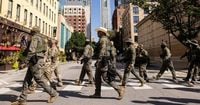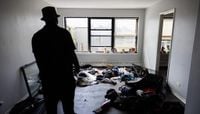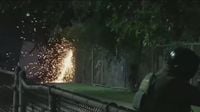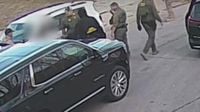In the early hours of October 1, 2025, the city of Chicago was shaken awake by a series of high-profile federal immigration raids, marking a dramatic escalation in the nationwide crackdown dubbed "Operation Midway Blitz." Federal agents, some in military fatigues and others in plainclothes, descended on multiple locations across the city, including a South Shore apartment building and a Bronzeville shelter, leaving communities rattled and raising urgent questions about the impact and intent of these enforcement actions.
According to ABC7, the first major operation unfolded just after 1 a.m. at 7500 S. South Shore Drive. Residents like Dan Jones, 27, were jolted awake by the sound of agents attempting to break down their doors. When Jones ventured into the hallway later that morning, he found broken doors scattered about and many of his neighbors missing. The Department of Homeland Security (DHS) confirmed that 37 people were taken into custody during this raid, which they described as targeting individuals involved in drug trafficking, weapons crimes, and immigration violations. DHS further asserted that the area was frequented by members of the Venezuelan Tren De Aragua gang, though, as Chicago Sun-Times noted, officials did not provide concrete evidence linking those arrested to the gang or to violent activity in Chicago.
Residents painted a harrowing picture of the raid’s aftermath. Jones returned home from work to discover his electronics and furniture missing, and his clothes strewn across the floor. "I’m pissed off," Jones told the Chicago Sun-Times. "I feel defeated because the authorities aren’t doing anything." His frustration was echoed by others who reported property damage, missing belongings, and a sense of violation that lingered long after the agents had left.
Rodrick Johnson, a 67-year-old U.S. citizen, recounted being dragged from his apartment in zip ties and left outside for nearly three hours. "I asked [agents] why they were holding me if I was an American citizen, and they said I had to wait until they looked me up," he said. "I asked if they had a warrant, and I asked for a lawyer. They never brought one." The raid, which involved agents from Border Patrol, the FBI, and the Bureau of Alcohol, Tobacco, Firearms and Explosives, was described by witnesses as a "violent show of force." According to neighbors, agents used flashbang grenades, drones, and helicopters, rounding up men, women, and children—some of them unclothed—and loading them into U-Haul vans. Ebony Sweets Watson, who lives across the street, told the Chicago Sun-Times, "It was heartbreaking to watch. Even if you’re not a mother, seeing kids coming out buck naked and taken from their mothers, it was horrible."
Community activists and local organizations quickly condemned the tactics. Veronica Castro of the Illinois Coalition for Immigrant and Refugee Rights told CBS News Chicago, "Hundreds of masked agents knocking down doors and dragging families out in the middle of the night, holding babies that were unclothed—that’s not right. Folks that were just trying to live their lives in this community. Does that look like safety to you? No!" Brandon Lee, a spokesman for the same group, added, "It was a violent show of force in the middle of the night. Taking families out of an apartment building in a residential neighborhood like that is harmful, is traumatic, and that is not something that people can easily recover from, whether they themselves were taken or whether they witnessed it."
Just hours after the South Shore operation, another raid unfolded at a shelter in Bronzeville. As reported by WGN-TV and ABC7, seven unmarked federal vehicles arrived suddenly around 9:15 a.m., and agents immediately began chasing migrants outside the facility. Surveillance cameras captured the chaos as at least four people were taken into federal custody, though one was later released. The shelter, which houses about 260 people—including both migrants and unhoused Chicagoans—was left reeling. "It's pretty unbelievable, and you don't really realize it," Lakreshia Kindred, executive director of Bright Star Community Outreach, told ABC7. "You see it on the news, you hear about it, but then once it actually happens in your backyard it's a completely different impact."
Shelter staff described the raid as "traumatizing" for residents, many of whom have already endured significant hardship and loss. "A lot of them are going through very difficult times," said Caryl R. West, executive director of Bright Star Community Development. "They're experienced hardship, loss, and trauma, and to be at a place where they're supposed to get shelter and safety then have that compromised—it just puts us in a very hurtful situation." The shelter has since begun providing mental health support to help residents cope with the aftermath.
Meanwhile, on Chicago’s Northwest Side, federal officers were filmed wrestling a man to the ground outside Roosevelt High School in Albany Park. According to 33rd Ward Alderman Rossana Rodriguez, at least five people were arrested in the area that day, with two of the arrests occurring near schools. Rodriguez expressed concern over the seemingly indiscriminate nature of the arrests, telling ABC7, "There was no operation going on. They just saw people in vehicles, and they just took them."
These raids represent the most aggressive phase yet of "Operation Midway Blitz," an initiative launched by the Trump administration on September 8, 2025, which has brought a surge of federal immigration officers to the Chicago area. The South Shore raid was described by WGN-TV as the largest such operation in the city to date. DHS has stated that the crackdown targets individuals involved in serious criminal activity, but community members and advocates argue that the broad sweep has ensnared many who pose no threat, including U.S. citizens and families seeking safety.
Adding to the confusion, the government shutdown has delayed press communications from DHS, leaving many questions about the raids unanswered. Officials have not clarified how many of those arrested were actually gang members or involved in criminal activity, and the lack of transparency has only heightened anxiety among Chicago’s immigrant communities.
As property managers at the South Shore building disposed of broken doors and mattresses, and as shelter staff in Bronzeville scrambled to support traumatized residents, the city was left to grapple with the fallout from a day that exposed the deep divisions and human cost at the heart of America’s immigration debate. For many Chicagoans, October 1, 2025, will be remembered as a day when the promise of safety and shelter was put to the test—and, for some, found wanting.




